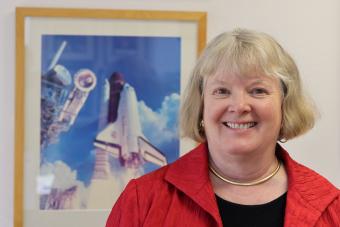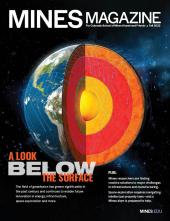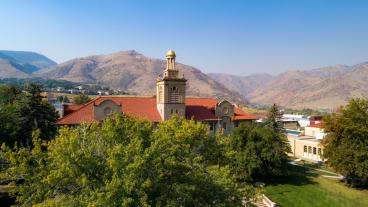Mines alum navigates legal challenges of commercialization of space

By Anna Squires, Special to Mines Magazine
When the first gold flakes appeared in the Sacramento Valley in early 1848, the discovery sparked the American Gold Rush faster than a gasoline fire. But the next great rush for precious metals will take place much farther than California: outer space. And it will happen soon.

“This is the Wild West,” said Deborah Peacock ’78, president of Peacock Law P.C., the largest intellectual property firm in New Mexico, which specializes in legal issues within the spaceflight and aerospace industries. “It is a space race.”
Peacock’s law firm represents clients all over the world who are pursuing extraction and mining technologies in space. And similar
to the late 19th century, this new rush for mining claims promises to be challenging, both technically and legally.
Some of those challenges arise from the few existing laws that regulate commercialization beyond Earth.
When a spacecraft launches from Earth, Peacock explained, it is subject to the laws of the country from where it launched, including patent law. Companies can take advantage of the regulation by registering a space-bound object in a country where the invention has not been patented, thus sidestepping its owner’s intellectual property rights. Peacock spends much of her time working with clients to ensure they are protected with intellectual property agreements filed in every country with a launch site.
On a larger scale, the policies in place to prevent Gold Rush-style disputes over mining claims are also worryingly out of date. “As patent attorneys, we work in the future,” Peacock said. “But since the Outer Space Treaty was signed in 1967, space law hasn’t changed much.”
That treaty, which still forms the basis of international space law 55 years after it was written, has critical gaps.
“Under the Outer Space Treaty of 1967, no country is allowed to appropriate objects in outer space,” Peacock said. “But the signatories didn’t know that private companies would one day be doing that. And that’s really where we’re headed: private space.”
More recent agreements, like the 2020 Artemis Accords, have failed to unite space-going nations. In addition to returning humans to the Moon by 2024 and establishing a crewed lunar base by 2030, the Accords created a code of ethics for future space exploration—asking signatories to promise to be “good neighbors” by keeping space operations peaceful and sustainable. But Russia and China, two of the world’s most prominent spacefaring nations, have refused to sign the Artemis Accords.
The gaps in current policies essentially form loopholes for private companies to race to the Moon in pursuit of its “nearly unlimited” resources, including rare earths, volatiles, Helium-3, titanium and platinum. Their value, Peacock said, will likely incentivize a rush to stake mining claims on the Moon, because they have the potential to revolutionize space exploration and habitation. Even the Moon’s water and ice are valuable; they can be electrolyzed to form hydrogen and oxygen propellant, allowing rocket fuel to be processed in space.
And thanks to these critical gaps in policy, the Gold Rush-era reality of mining claims—staked on a first-come basis and over which disputes were solved with violence—may not seem far-fetched.
Peacock, however, believes that most space-going nations will stay civil. “Most of the space nations are fairly responsible countries,” she said. “They may not agree with each other, but they’re responsible for their own activities.”
And although much of the existing regulation is in place on a country-by-country basis, the U.S., for instance, is “regulated in almost every way, including in space,” Peacock said. Ten or more agencies must give permission for spacecraft prior to launch and regulate everything from licenses for launch and re-entry to space debris.
One thing that seems certain, Peacock said, is that the race to mine asteroids and celestial bodies—and the exploration it could fuel—will happen much sooner than she once thought. In 2017, Peacock predicted that mining and mineral processing would reach the Moon in the next 20 years. Now, she predicts it will happen in five.
But, Peacock admitted, “I’m an optimist. I believe there’s a really bright future for outer space. We need to become independent of Earth eventually, just in case. That bright future could include many colonies and many space ventures.”
Above all, she urges Mines students to take advantage of educational opportunities in the field, especially through Mines’ Space Resources program—the first in the world to focus on education for the growing space resources field.
“Outer space is no longer just for aerospace engineers, astronomers and physicists. It requires expertise in everything from artificial intelligence to public policy and law,” Peacock said. “If you are interested in outer space, there is a way to be involved, no matter what your degree and expertise.”




